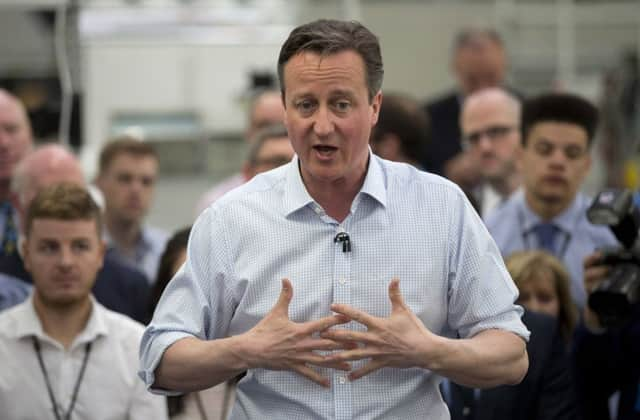UK economic growth dip a blow for the Tories


The last major set of economic data from the Office for National Statistics to be released before polling day showed GDP grew by just 0.3 per cent in the first three months of this year – half the rate of growth achieved in the preceding quarter and the weakest since the final quarter of 2012.
Labour said the worse-than-expected figures showed the government’s plan to “fix” the economy had failed and that a new direction was needed.
Advertisement
Hide AdAdvertisement
Hide AdAt a campaign event in Cardiff, Labour leader Ed Miliband said the figures showed there were still “big problems” in the economy.
“While this government has been trying to run a victory lap, they have been leaving the British people behind,” he said.
“What these figures illustrate is that, far from the economy being fixed, they are further proof that there are big problems in our economy – big problems which are leading to the cost-of-living crisis that so many families are facing.
“That’s why we need a better plan, a better plan that puts working people first again in our country.”
But with nine days to polling, the Prime Minister insisted the slowdown underlined the need to stick to the existing strategy, warning a Labour government would bring the economy “juddering to a halt”.
On a campaign visit to a factory in north London, Mr Cameron said the figures showed why the country could not afford to vote for the “instability” a Labour government led by Mr Miliband would bring.
“They show that we cannot take recovery for granted – we can’t take our growth for granted,” he said.
“All of this is at risk in nine days time. With me you know what you get: you keep the plan, you keep the growth, you keep the jobs, you keep the security. With him, what are you going to get?
Advertisement
Hide AdAdvertisement
Hide Ad“If he goes on a borrowing spree, interest rates will go up and that will hit businesses, that will hit families. If he goes on a spending spree, taxes will go up – that will hit businesses, that will hit families.
“If he goes on a regulation spree, that will stop investment – that could bring our economy to a juddering halt.”
Meanwhile, asked whether voting for the SNP was “risking the economy”, First Minister Nicola Sturgeon, campaigning in South Queensferry, said: “I think the GDP figures today actually highlight the need for an alternative to austerity, for modest spending increases that can not only see investment in our public services and lift people out of poverty, but also investment in actions to get our economy growing faster, to get more people into jobs and to raise our revenues.
“In many ways the GDP figures that are out today underline that driving need to see an alternative to Tory austerity.”
Ms Sturgeon accused Mr Cameron of warning that the Union is in peril “every time he is under a bit of pressure” and insisted the election was not a rerun of last September’s referendum.
Earlier, Lib Dem leader Nick Clegg set out his latest “red line” demand to the Conservatives and Labour for an emergency Budget within 50 days of the election if they want a coalition deal with his party.
He made clear he would effectively veto Tory plans to cut £12 billion from welfare and impose a timetable on Labour to deal with the deficit.
“Whether we are in government with Labour or the Conservatives, we will pin them down within weeks of the election and force them to put their cards on the table,” he said.
Advertisement
Hide AdAdvertisement
Hide Ad“We will have a stability Budget, to take place within 50 days of election day, a precondition of any coalition arrangement. There will be no deal if there is no stability.”
However, shadow chancellor Ed Balls dismissed his “red line” warning on deficit reduction, insisting a Labour government would not speed up the pace of cuts in order to meet the Lib Dems’ demands.
“What we are not going to do is sign up to faster plans which would end up meaning huge cuts to police or defence or our public services,” he said.